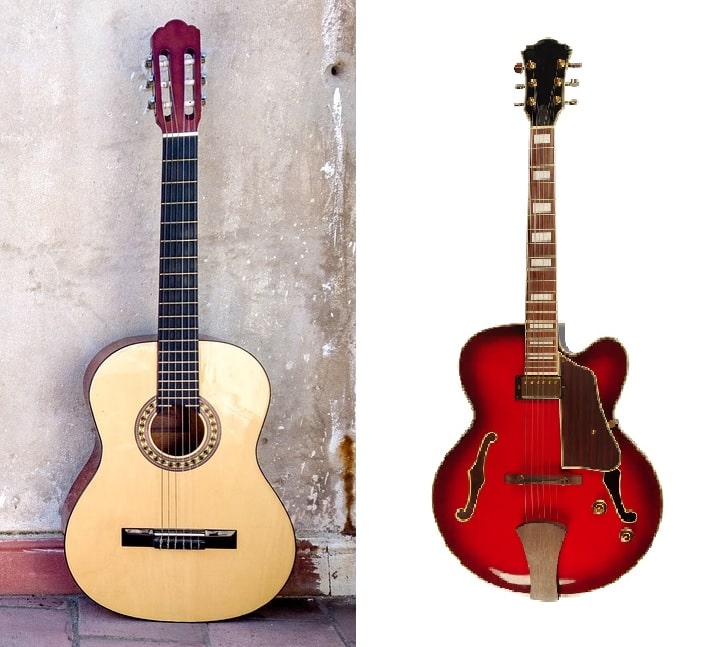
As strange as it may sound, classical guitars and jazz guitars have a few things in common. Naturally, these similarities they share aren’t really hardware related. Rather, they have to do with how these instruments are perceived.
Comparing a classical guitar vs a jazz guitar may come across as redundant to most. These instruments are about as far away from each other on the spectrum as possible. Even so, we can learn a thing or two by looking at them side by side and discussing certain differences.
Classical Guitar Vs Jazz Guitar
Classical Guitar
Classical guitars are viewed as the OG stringed instrument. To current generations, this is often an ancient type of guitar. However, that awesome Cordoba or La Patrie you are thinking about getting is anything but ancient. Contrary to popular belief, modern-day classical guitars are a relatively new design. They have been around since the 19th century. What we refer to as classical guitars are actually Spanish guitars.
None of that changes the fact that classical guitars are what everything else came from. That fancy vintage Les Paul? It traces its roots back to a classical guitar. The fact that classical guitars are still as popular as they are is a great testament to their design and impressive sound. The real question is how would a classical guitar stack up against a jazz guitar? Let’s see what jazz guitars are and then we will do a comparison
Jazz Guitars
These days jazz guitars are a very niche type of guitars that not everyone is interested in. As a matter of fact, they have been quite exclusive until very recently. First of all, we have to clear up a few things. You can technically play jazz on any kind of guitar. We’re talking anything from a classical to the most aggressive, active metal ax you can find. However, jazz guitars have become the norm.
The next logical question would be ‘what exactly is a jazz guitar?’ and it would be a legitimate one. At the moment, any electric semi-hollow or hollow guitar falls within the jazz guitar category. These are old instruments that predated modern solid-body electric guitars. You’ll find them in hands of many legends out there including The Beatles, Chuck Berry, and many others.
Jazz Guitar ‘Twang’
One thing both classical and jazz guitars have in common is a sound that is unique to each instrument. With classical guitars, it is that mellow sound of nylon strings being plucked by a skilled fingerpicking artist. As for jazz guitars, you are looking at that jazz guitar ‘twang’. This brings us to another interesting topic.
Why are hollow and semi-hollow guitars so popular among jazz musicians? Semi-hollow and hollow guitars rely on pickups to give them the primary sound color. However, the sole fact that these have semi-formed or completely formed resonator boxes sprinkles a whole other layer of flavor on top of those pickups.
The whole ‘twang’ thing doesn’t much to do with this primary tone color hollow guitars have. The twang effect comes from the way the guitar is stringed as well as the pickups it packs on-board. With all that said, when you combine the twangy hardware with a colorful sounding body, you get a mix that has become incredibly popular among established jazz musicians.
There is simply more to work with on jazz guitars than on a typical Stratocaster. Not to mention that custom made jazz guitars only amplify this effect. Every luthier out there has a signature sound of their own. Something that you can attribute to them specifically. All in all, jazz guitars are complicated, massive and oftentimes overwhelming for newer guitar players. On the other hand, they offer the type of sound you just can’t find elsewhere and that is more than enough for most jazz guitarists out there.
Similarities That Don’t Meet the Eye
Now that we know what both the classical and jazz guitars offer, let’s talk about some similarities that don’t meet the eye. Comparing these two types of guitars probably sounds super silly to anyone who has ever seen them, but hears us out.
Both the classical and jazz guitar requires a lot of skill. Playing classical music is extremely hard. You have to be the master of your trade, fully confident in your skills and versed in theory if you want to be a classical guitarist. On the other hand, jazz guitar is a whole new level of complexity. Jazz music is what happens when skilled musicians decide that they need a challenge.
Working with jazz chords is insanely tough even for formally trained musicians. In that sense, classical and jazz guitars are rather similar. You will need to spend a lot of time practicing, learning and mastering various techniques if you want to be among the best. But wait, there’s more.
One of the important aspects of jazz is one’s ability to improvise. Legit jazz jam sessions are truly incredible. Developing the skills necessary to get on stage with a bunch of professionals and just snap into a groove on a tempo count is hard. Some would say that improvisation skills differentiate real pros from casuals but that is a topic for a whole different discussion.
Conclusion
Classical guitar vs jazz guitar is a comparison that reveals just how similar these two otherwise different guitars are. Both are an acquired taste and something only a few truly master within their lifetimes.
Then again, both can be pushed into less demanding genres of music and enjoyed by the masses. In other words, if you want to play classic rock but like the aesthetics of a Gretch semi-hollow, go for it. Don’t worry about it being a jazz guitar. These axes are more than capable of keeping up with rock music. Just ask Jack White.
